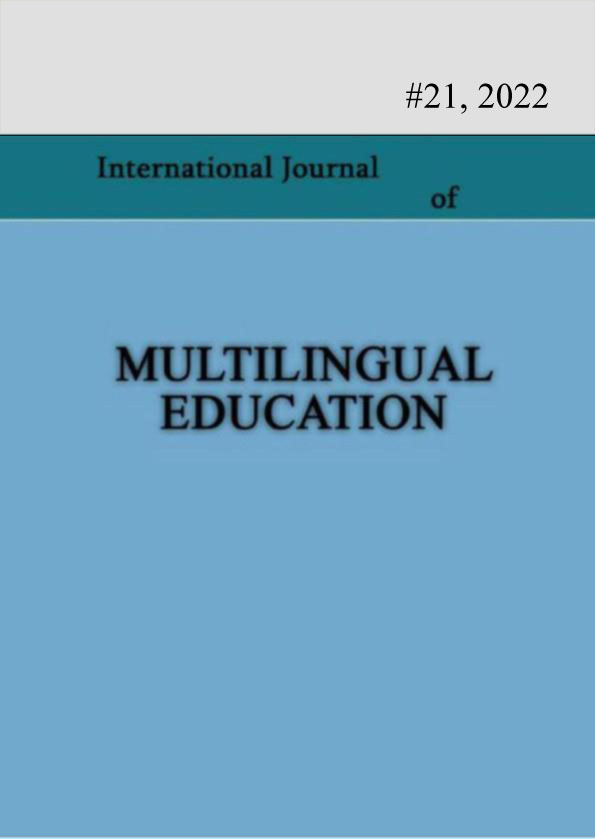Development of Reading Ability in Childhood by the Example of Georgian Language
Keywords:
Paremiology; Proverb; Culturology; Onomastics; Kartvelian languagesAbstract
Reading as a skill is divided into many subskills, which take almost entire early childhood to develop. Children go through stages of getting comprehension of phonemes and grammar structure until they can connect letters to sounds and read without problems. Learning how to read in second language is usually harder because of new sets of phonemes and differences in alphabet. On the other hand, learning how to read Georgian Language might be easier than most other languages. Georgian Language has 33 phonemes and 33 letters of alphabet, which directly correspond to each other. Reading is straightforward due to no differences between what is written and how it should be pronounced. The article will be covering how reading skill develops in children and how these aspects might be connected to learning to read Georgian.
References
Bowles, A., Golonka, M., Frank, V. & Richardson, D., (2014). Technologies for foreign language learning: a review of technology types and their effectiveness, Computer Assisted Language Learning, 27:1, 70-105, DOI: 10.1080/09588221.2012.700315
Darnell, C.A., Solity, J.E. & Wall, H. (2017). Decoding the phonics screening check. Br Educ Res J, 43: 505-527. https://doi.org/10.1002/berj.3269
Double, K., McGrane, J., Stiff, J., & Hopfenbeck, T.N., (2019). The Importance of Early Phonics Improvements for Predicting Later Reading Comprehension, British Educational Research Journal 45(1), DOI:10.1002/berj.3559
Dougherty Stahl, K.A. (2011). Applying new visions of reading development in today's classrooms. The Reading Teacher: A Journal of Research-Based Classroom Practice, 65(1), 52–56. doi: 10.1598/RT.65.1.7
Duff D., Tomblin J. B., Catts H. (2015). The influence of Reading on vocabulary growth: A case for a Matthew effect. J. Speech Lang. Hear. Res. 58, 853–864. doi: 10.1044/2015_JSLHR-L- 13-0310
Frijuniarsi, N., Marlianingsih, N. (2016). The Effects of Reading Habit and Vocubulary Mastery Towards Students’ Listening Skill as State Senior High Schools in East Jakarta. Lingua Cultura, 10(1), 19-24.http://dx.doi.org/10.21512/lc.v10i1.828
Fuchs, L. S., Fuchs, D., Hosp, M. K., & Jenkins, J. R. (2001). Oral reading fluency as an indicator of reading competence: a theoretical, empirical, and historical analysis. Sci. Stud. Read. 5, 239–256. doi: 10.1207/S1532799XSSR0503_3
Godoy, D. M. A., Pinheiro, Â. M. V., & Citoler, S. D. (2017). Initial literacy: Influence of phonemic awareness and teaching method. Psicologia: Teoria e Prática, 19(3), 226–241. https://doi.org/10.5935/1980-6906/psicologia.v19n3p226-241
Hayati, A. (2016). The Correlation between Indonesian students’ vocabulary mastery and their reading comprehension. Al-Ta Lim Journal, 23(2). doi: http://dx.doi.org/10.15548/jt.v23i2.217
Huang, F. L., Tortorelli, L. S., & Invernizzi, M. A. (2014). An investigation of factors associated with letter-sound knowledge at kindergarten entry. Early Childhood Research Quarterly, 29(2), 182–192. https://doi.org/10.1016/j.ecresq.2014.02.001
Isakadze, T. & Lomidze N. (2020). ისაკაძე თ., ლომიძე ნ., განმავითარებელი აქტივობების კრებული - გზამკვლევი მასწავლებლებისა და მშობლებისათვის / A collection of developmental activities - a guide for teachers and parents.
Justice, L. M., Bowles, R. P., Kaderavek, J. N., Ukrainetz, T. A., Eisenberg, S. L., & Gillam, R. B. (2006). The index of narrative microstructure: A clinical tool for analyzing school-age
children’s narrative performances. American Journal of Speech-Language Pathology, 15(2), 177-191. https://doi:10.1044/1058-0360(2006/017)
Kuhn, M. R., & Stahl, S. A. (2003). Fluency: developmental and remedial practices—revisited. D. E. Alvermann, N. J. Unrau, & R. B. Ruddell (Eds.), Theoretical Models and Processes of Reading içinde. International Reading Association.
Labartkhava, N. (2013). ლაბარტყავა, ნ., სწავლა-სწავლების თავისებურება კლას- კომპლექტებში განათლების დაწყებით საფეხურზე / Peculiarities of teaching and learning in classrooms at the primary level of education; Mastsavlebeli. 2013, #1.
LaBerge, D., & Samuels, S. J. (1974). Toward a theory of automatic information processing in reading. Cognitive Psychology, 6(2), 293–323. https://doi.org/10.1016/0010-
0285(74)90015-2
Published
How to Cite
Issue
Section
License
Copyright (c) 2022 Maia Shavshishvili

This work is licensed under a Creative Commons Attribution-NonCommercial 4.0 International License.
Copyright (c) - Authors who publish with this journal agree to the following terms: Authors retain copyright and grant the journal the right of first publication with the work simultaneously licensed under a Creative Commons Attribution-Noncommercial 4.0 International License, which allows others to share the work with an acknowledgement of the work's authorship and initial publication in this journal. Authors are permitted and encouraged to post their work online (e.g., in institutional repositories or on their personal website) prior to and during the submission process, as it can lead to productive exchanges, as well as earlier and greater citation of published work (see The Effect of Open Access). Authors may enter into separate, additional contractual arrangements for the non-exclusive distribution of the journal's published version of the work (e.g., post it to a repository or publish it in a book), with an acknowledgement of its initial publication in this journal.

